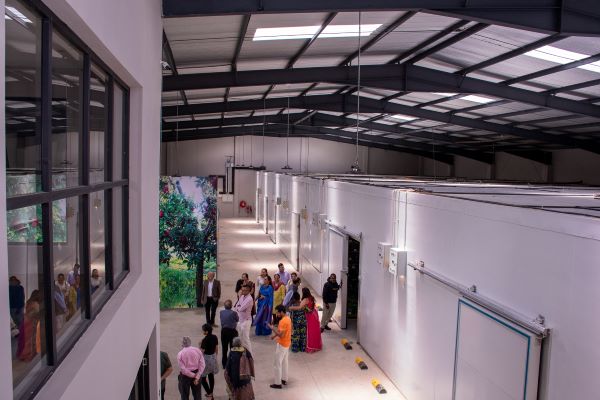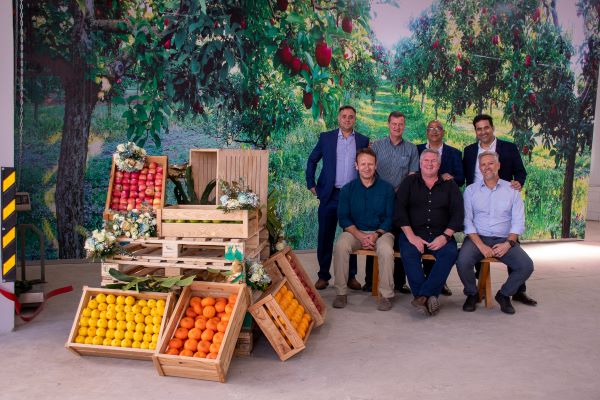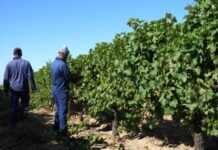In a major boost for fruit security in Eastern Africa, two South African fruit exporting companies together with local Kenyan partners, recently opened the doors of a brand new state-of-the-art cold storage facility in one of Kenya’s foremost commercial complexes.
Fruitbox Ltd., a Kenyan importing and distribution company, was formed in 2014 and is owned by two South African companies, Vitanova International and Tru-Cape Fruit Marketing, as well as Messrs. Sandip Jethalal and Bhaumik Shah, both with a long history in the Kenyan fresh produce industry.
Fruitbox Ltd. is the exclusive importer for Tru-Cape in Kenya. These products include apples, pears, cherries and soft citrus. Fruitbox also imports citrus and table grapes from Southern African countries and Egypt, as well as kiwi fruit from Europe and South America.
“While we previously leased cold storage, we had a need for more purpose-built infrastructure. This led to the next step in the evolution of our business, which was to build our own cold storage facilities,” says Nico de Lange, chairman of Fruitbox. Ltd, about the facilities worth US$1, 5 million that was launched on Sunday, 22 October.
The facility, with space for 800 pallets of fruit and seven loading docks, is exemplary of an integrated European approach to cold storage in terms of quality control, the handling of fruit and feedback.
“In Kenya we are the market leader in the way we handle and store our fruit. We classify all fruit on arrival and store it according to quality and shelf life. This ensures that stock is sold in optimum condition, with great shelf life and according to market conditions,” explains Nico, adding that it is the exception rather than the rule in Africa.
Fruitbox Ltd. also adds value with an outstanding reporting system, says Sandip Jethalal, general manager of Fruitbox.
“We send all data back to suppliers and maintain a very good cold chain. From the time of arrival to storage should not take longer than an hour.
Simon Cabral, director at Vitanova International, says it is part of their long term strategy to assist Fruitbox Ltd. as the leading importer in East Africa.
“Fruitbox’s vision is to work hand in hand with suppliers and customers to provide a first class service in this challenging sector.”
The modern space, located within the Tilisi development, about 30 km from Nairobi CBD and close to the A104 Nairobi-Nakuru Highway, enables Fruitbox Ltd. to conveniently receive fruit entering the country via sea freight from Mombasa or air freight from Nairobi. All distribution is done from the same premises.
“We are proud to be a part of Tilisi. They are progressive and fit our culture very well. We are excited to see their original vision coming into life.”
Fruitbox Ltd. is mitigating Nairobi’s occasional power outages with diesel generators, but part of the planning for phase two of the project includes solar panels.
“The premises allow us to double our capacity as we grow, and we hope to start building again in two years’ time.”
Gateway to East Africa
Roelf Pienaar, managing director of Tru-Cape Fruit Marketing, says the storage allows them to serve the entire East Africa.
Kenya is often described as the gateway to Central East Africa. A major share of the produce imported by Fruitbox Ltd. is destined for cross border trade with its land-locked neighbors such as Uganda, Rwanda, and South Sudan. The balance moves through the wholesale market in Kenya, with a small portion entering the local retail market.
According to Nico they see exciting opportunities brought along by Kenya’s pro-business approach and its fast-growing economy.
“Our vision is to serve the Central East African market in a bigger, better, and more efficient way. Our management of the cold chain and the quality of our cold storage and product handling, enables us to import and distribute more sensitive fruit types, broadening the product offering to the market. We believe the more product exposure we give to the people of East Africa, the bigger the growth will be.”
Apples remain the main product category in the whole of Africa, with a huge potential market for especially pink and bi-colour varieties.
“As our volumes of Pink Lady-apples grow, East Africa becomes key as a market outlet. There are also good opportunities for varieties such as Cripps Red and Flash Gala,” says Roelf.
“As the region with the largest population in Africa, we believe East Africa holds great prospective. It also offers a stable environment compared to the Western part of the continent.”
Sandip adds that the market, with a growing middle class, is also opening up for high value products such as cherries and smaller deciduous fruit.
“We realise that food may become scarcer in future. However, it is part of our strategic footprint to ensure sufficient fruit security in the East African region.”
For more information, please contact Lucille Botha at lucilleb@tru-cape.co.za or visit www.tru-cape.com. Follow Tru-Cape on X (@TruCapeFruit), Facebook (@Tru-Cape Fruit Marketing) and Instagram (@trucapefruit).








